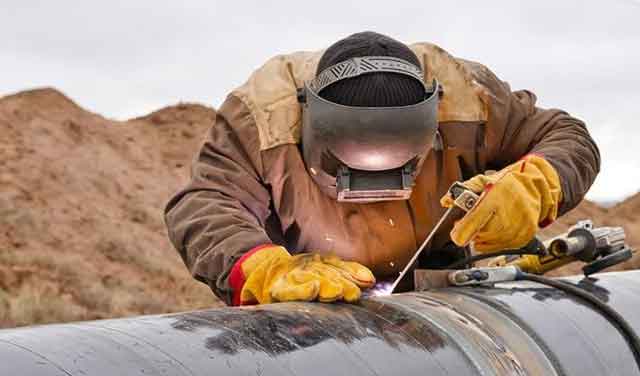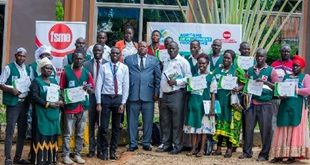
Local players think initiative could be late as oil companies are already publishing expression of interest for field services
Kampala, Uganda | RONALD MUSOKE | Uganda has started implementing a Shs 1.85bn project seeking to build technical skills of local micro, small and medium enterprises eyeing businesses during the construction phase of the East African Crude Oil Pipeline (EACOP).
Funded by the African Development Bank (AfDB), the project intends to support Ugandan and Tanzanian small businesses interested in tapping business opportunities along the oil pipeline, enabling them to access new market opportunities, and building linkages with larger, national, regional and international companies.
The construction of the EACOP is expected to start anytime soon once the Final Investment Decision is reached. The East African nation hopes to start oil production by 2024.
The US$3.5bn pipeline will start in Hoima in western Uganda traverse 10 districts – Mubende, Hoima, Gomba, Kyotera, Rakai, Lwengo, Kikuube, Kakumiro, Sembabule and Kyankwanzi – in Uganda and go through Tanzania to the Indian Ocean coastal town of Tanga.
Executives at the Ministry of Energy and Mineral Development said the new intervention is in line with the Intergovernmental Agreement (IGA) between Uganda and Tanzania that was signed in 2017 to promote cooperation in the development of the pipeline and enhance participation by the pipeline host communities.
Emmanuel Freddie Mugunga, the Under Secretary and Accounting Officer in the Ministry of Energy and Mineral Development said during the project launch in Mubende District on Jan.27 that the EACOP has raised the expectation of a significant economic upturn and creation of jobs.
“The reality, however, will be different if local small businesses do not have the capacity and experience to participate in oil and gas activities. We believe that small businesses have a major impact on economic growth, income and employment,” he said. Mugunga said the businesses should also focus on the soft skills such as customer care, hospitality, client retention and referrals.
Ernest Rubondo, the Executive Director of the Petroleum Authority of Uganda said the two year project commenced in September 2020 with the signing of the Grant Treaty between the Uganda government and ADB, and that it will end in 2022.
Juliet Byaruhanga, the Senior Private Sector Officer at AfDB who represented the Country Manager re-echoed the bank’s commitment to supporting Uganda actualise her development strategies.
She urged the district leadership and technocrats to provide the necessary support for the seamless implementation of the project.
However, Emmanuel Mugarula, the CEO of the Association of the Uganda Oil and Gas Service Providers, told The Independent on Feb.09 that although his members initially participated in the discussions of how best to manage and participate in the new initiative, it could be too late as the oil companies (Total and CNOOC) are already publishing expression of interest for particular services that will be required once the construction process begins.
Mugarula said once FID is announced, the IOCs will only work with companies that are only ready, irrespective of whether they are Ugandan or foreign.
 How the project will be implemented
How the project will be implemented
The project will be implemented in collaboration with the respective district local governments, targeting at least 100 local micro businesses in Uganda and Tanzania. Once the project has been implemented, it is also expected that it will link at least 70 business enterprises or other relevant business transactions undertaken on the pipeline, creating at least 500 jobs.
About 200 SMEs or more are expected to receive capacity building to enable them meet the supplier criteria of large companies as well as meet the lending requirements of commercial banks, and increase their potential of accessing new markets. The project also hopes to establish a minimum of 50 business linkages between micro enterprises and 20 linkages between SMEs and large companies.
It is also hoped that at least 100 local micro business enterprises will be formalised for purposes of doing business on the EACOP project while at least 70 memoranda of understanding will have been signed for business linkages between enterprises or relevant business transactions along the pipeline by 2021.
The project also targets at least 200 small businesses that are both women and youth-led supplying the oil and gas sector. The other beneficiaries will include local communities who will benefit from job opportunities, the associations of oil and gas service providers together with the private sector foundations in Uganda and the commercial banks, which may lend to the enterprises. The main contractors will also benefit from buy-in by the communities since they will benefit and contribute to the project.
Uganda discovered commercial hydrocarbon deposits in the Albertine rift basin that straddles its border with the Democratic Republic of Congo in 2006. However, production has been repeatedly delayed since then by contractual disagreements, tax disputes and infrastructure setbacks. Uganda’s recoverable oil stands at approximately 1.4 billion barrels.
****
 The Independent Uganda: You get the Truth we Pay the Price
The Independent Uganda: You get the Truth we Pay the Price


